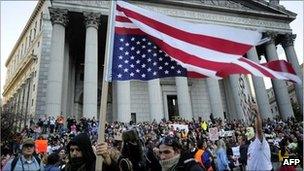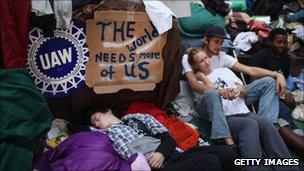Occupy Wall Street: Democrats and Tea Party take sides
- Published

New York protesters are leading the calls for change over a broad range of concerns
Established political groups have weighed into the debate over the Occupy Wall Street movement, as protests in New York and elsewhere rumble on.
The Democratic Congressional Campaign Committee announced its support for the movement via email and Twitter.
But the anti-tax group Tea Party Express called comparisons between itself and the protests "insulting".
New York Mayor Michael Bloomberg said demonstrators could stay in the city as long as the obeyed the law.
Protests over perceived injustices and inequalities continued over the weekend in cities across the US.
Hundreds of people turned out in dozens of towns and cities to protest against bank bailouts and what they see as an unfair distribution of income in the US.
A leftist Tea Party?
After starting on 17 September as a small-scale protest based around Wall Street in Manhattan, New York, Occupy Wall Street has now become large enough to force its way into the national political debate.
Announcing its support for the movement, the Democratic Congressional Campaign Committee - a group that aims to retake the House of Representatives for the Democrats in 2012 - signalled that it agreed with the ambitions of the movement.
"Protesters are assembling in New York and around the country to let billionaires, big oil and big bankers know that we're not going to let the richest one percent force draconian economic policies and massive cuts to crucial programs on Main Street Americans," the group wrote.
The Tea Party Express sent a fundraising email to supporters, the AFP news agency reported, arguing against drawing similarities between the rise of the Tea Party and the emergence of Occupy Wall Street.
"The only commonality that we have is that we are both opposed to the bailouts of Wall Street - and that is it."

Unions have offered their support to protesters
On Monday, organisers of the "leaderless resistance movement" in Zuccotti Park called for a "Kids Speak Out" day, as students have the day off for Columbus Day.
New York City Mayor Michael Bloomberg said protesters in Zuccotti Park would be allowed to stay indefinitely, as long as they obey the city's laws, the Wall Street Journal reported.
"The bottom line is - people want to express themselves. And as long as they obey the laws, we'll allow them to," Mr Bloomberg said. "If they break the laws, then, we're going to do what we're supposed to do: enforce the laws."
The Rev Al Sharpton hosted his nationally-syndicated radio talk show from the protesters' camp. He was joined briefly by rap star Kayne West.
Elsewhere, more than 300 members of Columbia University's faculty have signed a petition in support of the protests.
"The professors join the Occupy Wall Street movement in condemning the growth of economic, social, and political inequalities," a statement said.
Members of the online activist group Anonymous took down the website of the New York Stock Exchange for one minute on Monday afternoon, reports said. Trading was not affected.
Museum shutdown
Debate over the movement's merits - or otherwise - began on US talk shows on Sunday.
"There's nothing that makes you angrier than not being able to provide for your family or understand what your prospects are for the future," Democrat Nancy Pelosi, minority leader for the House of Representatives, told ABC News.
"I support the message to the establishment, whether it's Wall Street or the political establishment and the rest, that change has to happen," she said.
Meanwhile, Republican presidential hopeful Herman Cain criticised similar demonstrations in Washington, calling protesters jealousy-stricken Americans who wanted to "take somebody else's" Cadillac.
On Saturday, the Air and Space Museum in Washington was shutdown after protesters tried to enter the building and were pepper-sprayed by police.
Paul Ryan, a leading House Republican, told NBC he did not disparage anyone who "protests their government for better government," but called the anti-establishment rhetoric "troubling".
- Published10 October 2011
- Published2 October 2011
- Published3 October 2011